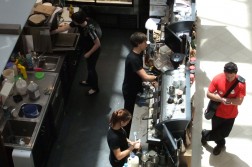On 27 September 2005 John Howard proposed changes to the existing statutes on sedition and seditious intent, changes which were designed as part of the Federal Government’s new Anti-terrorism Bill. Within days of the Bill’s introduction, a broad coalition of artists, performers, journalists, publishers and civil libertarians condemned the proposed laws as a threat to free speech. Why, they asked, were the existing sedition laws, last used in this country in the early 1960s and effectively defunct ever since, being revitalised at a time when practically every other Western democracy had removed the crime of sedition from their statutes?
The obvious targets of sedition laws are the religious extremists who preach a path of violence from whatever pulpit they occupy, although let’s be honest at this moment in time, the laws are aimed squarely at the extremist imams advocating jihad against the West, and Australia in particular. Many would argue that the current climate of fear and paranoia has presented a golden opportunity for governments to clamp down on any form of dissent or questioning. But, even leaving such theories aside, it’s plain that the haste with which the laws were introduced has made the sedition provisions a very wide catch-all driftnet indeed.
So, what does the potential prosecution of the sedition laws mean to the likes of the Wharf Revue and the freedom of theatre-makers generally? In the balance of probability, not a great deal. The new laws pose a far greater threat to journalists and publishers, who are understandably concerned about the threat to free speech and other provisions buried within the Anti-terrorism Bill.
That said, if you are, say, an Islamic comedian in this country, you have every right to be worried. The Wharf Revue has always operated within the mainstream, while historically sedition has been used on ideological grounds as an instrument of social control against those outside it. For example, we operate within socially acceptable parameters, such as recognising the legal supremacy of secular authority. A satirist arguing for a different set of beliefs could face prosecution. Like all humour, satire is subjective and the laws’ nebulous definitions give the authorities an unnecessarily strong hand.
I believe the greatest and most immediate threat in the existing laws lies in the ‘chilling effect’ of self-censorship. Organisations that rely on government subsidy and there are few professional arts bodies in this country that do not to some extent rely on it may be wary of programming or commissioning works that could be construed as seditious and therefore liable to put their funding in jeopardy. Are not the major theatre companies, or public broadcasters like the ABC and SBS, likely to think twice before presenting material that might fall within the ambit of the sedition laws, or at best provoke lengthy and costly legal action?
Hannie Rayson’s play, Two Brothers, which deals with a fictional pair of siblings bearing an uncanny resemblance to Federal Treasurer Peter Costello and his brother Tim, had a much higher political profile and caused its producers, the Melbourne and Sydney Theatre Companies, considerably greater problems than anything in six years of Wharf Revues. Government disapproval was articulated to the point where the Chair of the Melbourne Theatre Company, Ian Rennard, was contacted by the Federal Minister for the Arts and asked, ‘Why do you bite the hand that feeds you?’
But bear in mind that that particular incident of political interference occurred in early 2005, before the drafting of the sedition laws. How much more likely that, in a heightened atmosphere of suspicion, such calls could become more commonplace? And, if vigorous prosecution under the present democratic tolerance enjoyed by this country seems unlikely, future governments may be even less benign than the current one. All wedges have at least one thin edge.
The defence of artistic license has been challenged many times in this country. The very interpretation of what constitutes ‘art’ has long been contentious. For example, the recent case brought against 2004 Archibald Prize-winner Craig Ruddy hinged on whether or not his entry constituted a ‘painting’ or a ‘drawing.’ The presiding NSW Supreme Court Judge, Justice John Hamilton, commented: ‘There is a certain appearance of strangeness in courts making determinations concerning the qualities of works of art. The matter is better left to those in the art world.’
How then can we confidently expect a court to define terms such as ‘artistic performance or exhibition’ or ‘genuine artistic discussion’. Or, indeed, ‘commentary about a matter of public interest’? Might not one man’s commentary very easily be another’s polemic?
 |
|
Thanks to Leahy |
Legal definitions aside, the current Executive Producer at Melbourne’s Malthouse Theatre, Stephen Armstrong, thinks there might be a problem if an audience were to regard material put before it as seditious. In an atmosphere charged with threat and suspicion, audiences are hardly likely to wish to be thought unpatriotic. A long bow, perhaps, but for more mainstream companies it could be a consideration that affected their programming decisions. The effect has certainly been felt in America. After his Nobel lecture last year, in which he railed against US foreign policy and branded the invasion of Iraq ‘a bandit act, an act of blatant State terrorism,’ Harold Pinter quickly found that his plays had become an endangered species in US theatres. Revue, however, enjoys the advantage of not being ideologically driven. The general perception is that everyone is a target for its barbs.
A further implication of self-censorship in the modern age of terrorism is the reluctance on the part of both artists and managements to present material that may provoke a response from those extremist elements that the sedition laws are supposedly intended to suppress. Threats against personal safety can have a dampening effect on one’s enthusiasm to turn a spotlight onto radical Islam, for example. Stage productions have already been cancelled in Britain because of death threats against the box-office staff.
Yet, for all the talk of sedition, the most pressing obstacle to freedom of satirical expression comes from defamation laws. The per-capita incidence of defamation is higher in Sydney than in London or New York. The mere receipt of a solicitor’s letter threatening a defamation suit is usually sufficient to have the material in question censored because the cost of continuing the correspondence, let alone defending the action, is simply prohibitive.
 |
|
Cover: Satire – or Sedition? by Jonathan Biggins |
Over the course of a long career Max Gillies has been the target of several defamation suits, notably from the late Kerry Packer, who objected to a sketch on The Gillies Report that linked him to allegations made in a Federal inquiry. Gillies sees defamation as a problem because it is in the nature of the satirist’s job to be derogatory about public figures; comic effect demands distortion, and characterisation is often driven by inference or implication that is, shall we say, unflattering. But the more sensitive amongst us will only grant the Fool a certain licence, and there are some high-profile media identities who keep their reputations intact through the aggressive threat of defamation action. Ironically, they are often the most successfully and frequently sued defendants of defamation themselves happy to dish it out, but none too thrilled to take it!
While the relevance of theatre is frequently questioned, the growing demand for the Wharf Revue and others like it demonstrates that the theatre is still capable of responding with immediacy and effectiveness to contemporary events and issues. Ducking artfully behind the ambiguous screen of ‘It’s just a joke, mate,’ revue can deliver sharper blows than more serious forms of art or media and so contribute to a broader social awareness that might ultimately work to bring about political change.
The Revue offers an oppositional point of view to a political process that is increasingly removed from its constituents. The devaluation of parliament and our democratic institutions that has continued apace in the last decade has left the electorate largely cynical and uninterested. Good satire can re-awaken a desire for change, because in the hearts of all satirists is a belief in the worth of the institutions and customs they regard as being mismanaged, or, even worse, degraded or corrupt.
Not that we harbour any illusions about our capacity to change the world. Back in 1998, the satirist John Clarke said on ABC radio:
There is, I suppose, a fear with satire that all it does is keep people amused, while the system gets worse and worse and worse I mean, satirists are not on the bridge, they’re not steering the ship, and I don’t know that they can. And they are in great danger of becoming the band who plays ‘Abide with Me’ while the thing sinks.
Personally, I would be disguising myself as a woman and clamouring for the lifeboats, but I do take his point. And I’ve always borne in mind the words of Peter Cook, who described his political revue club, The Establishment, in London as ‘a satirical venue [after the fashion of]those wonderful Berlin cabarets that did so much to stop the rise of Hitler and prevent the outbreak of the Second World War’.
But then again, even the converted need to be occasionally preached to and reminded of why they converted in the first place.
The STC Wharf Revue‘s latest show ‘Revue Sans Frontières’ is playing at Sydney’s Wharf 2, from 8 November to 9 December. Bookings: 02) 9250 1777.
This is an edited extract from Jonathan Biggins, Satire or Sedition? The Threat to National Insecurity, (Platform Papers No 10, Currency House) RRP: $13.95
Donate To New Matilda
New Matilda is a small, independent media outlet. We survive through reader contributions, and never losing a lawsuit. If you got something from this article, giving something back helps us to continue speaking truth to power. Every little bit counts.



